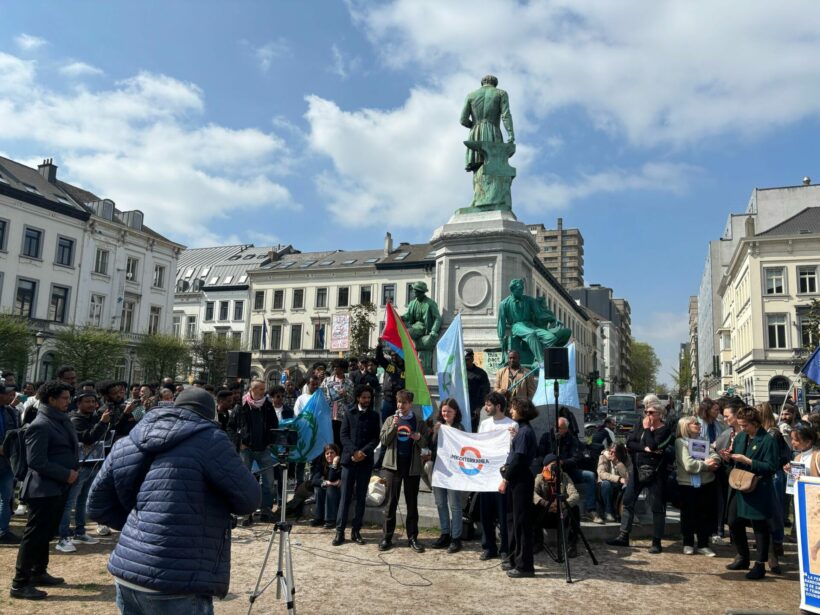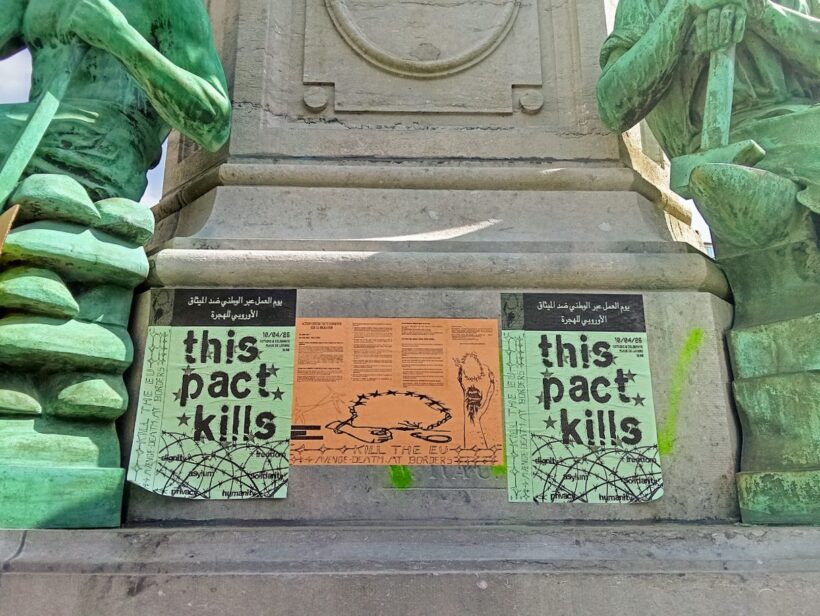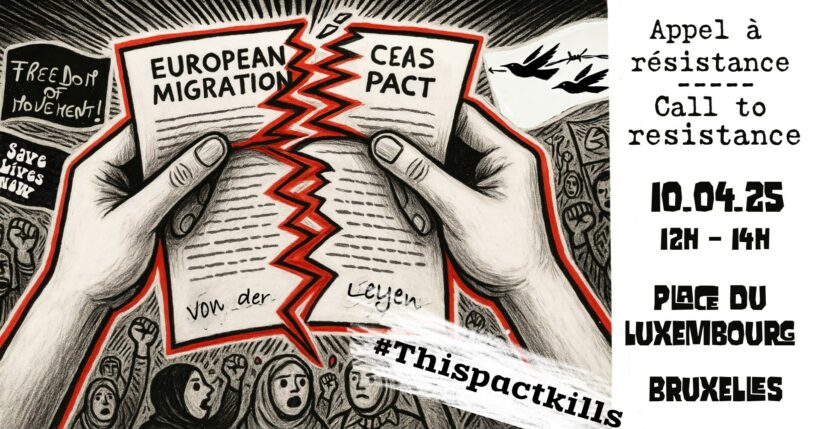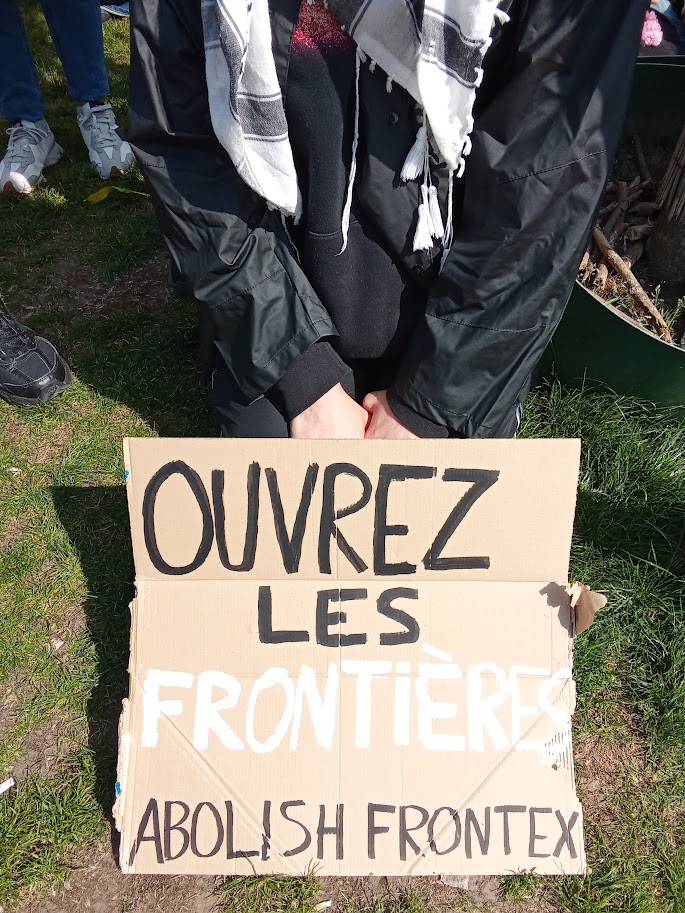On 10 April 2025, more than 200 people gathered at Place du Luxembourg in Brussels to protest against the consequences of the “EU Pact on Migration and Asylum”, approved precisely one year ago by the European Parliament. This demonstration, launched by the transnational committee “Abolish Frontex”, received support and participation from numerous organisations, including Action et Recherche Culturelles (ARC), Brussels Platform Armoede, CIRÉ, CNAPD, CNCD/11.11.11, Eritrea Democratica, Front de Mères, Getting The Voice Out, Présence et Action Culturelles (PAC), Réseau ADES, Médecins du Monde Belgique, and Mediterranea Bruxelles, and was part of a global mobilisation to denounce the most dangerous and rights-violating aspects of EU migration policies and their incompatibility with international solidarity principles.
The participants expressed a firm opposition to the legislation stemming from the EU Pact on Asylum and Migration, which they alert «would restrict freedoms and result in further loss of life at borders». They also denounced the agreements made by the EU and, in some cases, unilaterally by member states, notably Italy, with third countries such as Tunisia, Libya, and Albania, revealing methods and objectives deemed wholly incompatible with human rights and contrary to the values the EU claims to uphold both within its member states and internationally.
A PACT THAT KILLS BEFORE IT EVEN COMES INTO FORCE
The representative of the participating organisations and activities –including survivors of torture and trafficking – spoke in multiple languages to bear witness to the suffering of people in transit through detention centres in Libya, Niger, and the Mediterranean Sea, the world’s deadliest migration route, by highlighting the complicity of several European governments.
Two Members of the European Parliament, Özlem Alev Demirel (GUE/NGL, DIE LINKE) and Saskia Bricmont (Greens/EFA), also delivered clear messages during the demonstration. Demirel emphasised that the fight against the Pact goes far beyond asylum, stating that «it concerns our rights, human rights, and all the historical achievements we have reached as human beings», and firmly condemned the deportation plans as violations of these rights.
Saskia Bricmont sharply criticised the EU’s partnerships with countries that do not respect fundamental rights, calling for a radical change in European policies: «The true face of Europe is the one embodying rights, democracy, humanity, and solidarity. Our governments, the European Commission, and the majority in the European Parliament have chosen to trample on the right to asylum». She further denounced the political responsibility behind current deals: «Even though the Pact on Migration and Asylum is not yet in force, they have chosen to go even further by adopting new rules on returns, including forced returns, and promoting controversial partnerships with third countries. It is unacceptable, for example, that Giorgia Meloni’s regime in Italy cooperates with the Libyan regime, which allows the return of a person subject to an international arrest warrant, while conducting illegal surveillance operations against NGOs and migrants on Italian soil».
Gianmarco Riolo, representing Mediterranea Bruxelles, the Belgian branch of the civil society organisation engaged in monitoring and rescue operations in the Mediterranean Sea, declared: «This Pact is killing people, but also our democracies, by entrenching the idea of Fortress Europe, an old vision we must reject, which must not, under any circumstances, undermine European solidarity. We firmly oppose the attempts to impose detention centres in Albania under various pretexts, despite the efforts of the Italian government to conceal the failure of this policy».
The Mobilisations against the Administrative Detention and Deportations to Albania
The Brussels protest was also attended by several representatives of the awareness raising campaign « Who do you lock up? » (“Qui m’enferme ?”) against the administrative detention of undocumented people, launched last Saturday, April 5th, at the « House of Compassion » (la “Casa della Compassione”), in Brussels. This recent mobilisation builds on the long-term work of various anti-racist organisations and networks active in Belgium and beyond, particularly in the administrative detention centres. Their main aim is to counter the recent legislative surge aiming to extend a standard return system at the EU level based on a new legal framework that would allow a member state to recognise and directly enforce a return decision issued by another member state. In March 2025, the European Commission announced a legislative proposal to accelerate forced returns, paving the way for a neo-colonial and brutal deportation regime made possible through the active cooperation with third-country governments. The agreement between Italy and Albania could serve as a dangerous first test, which other EU member states are reportedly ready to replicate.



In this context, the detention centres built by the Italian government in Gjadër and Shëngjin, in northern Albania, are being closely monitored as “laboratories” for this future extraterritorial system. Although the first groups of migrants transferred to the centres between October 2024 and February 2025 were quickly repatriated to Italy after court rulings invalidated their detention, the Italian government persists in making these centres a cornerstone of its border externalisation strategy. On 29 March 2025, a new Decree-Law (37/2025) came into force to “repurpose” the repatriation facilities, while pending a ruling by the Court of Justice of the European Union, expected in the coming weeks. In his Opinion in Joined Cases C-758/24 | [Alace] and C-759/24 | [Canpelli] presented on 10 April, the Advocate General of the CJEU Richard de la Tour declared that «a Member State may designate safe countries of origin by a legislative act and must disclose, for the purpose of judicial review, the sources of information upon which that designation is based». This statement leaves actually open the ongoing debate between courts and states over the months-long effort to arbitrarily and rapidly modify the lists of so-called “safe countries of origin”, while simultaneously pursuing bilateral deals with other states such as Bangladesh and Pakistan.
Thus, in an increasingly repressive climate on migration policy, the 10 April demonstration at Place du Luxembourg in Brussels sent a strong collective message: Another Europe is possible, one based on human rights and solidarity. The organising groups and movements stressed that, even before its expected entry into force in mid-2026, the Pact is already causing increased detention at borders, even for the most vulnerable, fast-tracked expulsions, and systematic barriers to access international protection. The collective commitment to continue mobilising against a system reported as inhumane and ineffective was reaffirmed, raising a strong voice for a European migration policy grounded in dignity, welcome, and social justice.
photos : Alessandro Ermini






